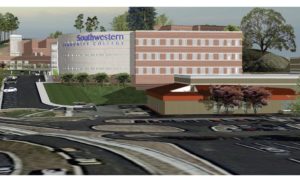Originally published in The Sylva Herald by Gavin Stewart
To say the students and faculty of Southwestern Community College’s Health Science programs are cramped is an understatement.
But that’s about to change.
Construction documents for SCC’s new Health Sciences building, a project that will expand opportunities for students and offer more services to North Carolina, are currently being reviewed by the State Construction Office and are due back to SCC by the end of April.
The current space that Health Sciences operates in encompasses faculty-sharing offices not conducive to privacy, large storage cabinets full of equipment gathered in the halls, a 20-person respiratory lab no larger than an office and a substance abuse program in an old computer lab.
“While the students are getting the education they need, it makes the faculty have to work that much harder,” said Mitch Fischer, Dean of Health Sciences at SCC. “Given the proper tools and space, we could keep the level of education as high as we have it but allow us to educate more students.”
SCC offers 14 Health Sciences concentrations, which is the most out of any community college in North Carolina. Fischer hopes that this new building will ensure that SCC is what people think of when they hear allied health and medical training.

Artist’s rendering of Southwestern Community College’s new Health Sciences building.
The school will be able to add 280 students within Health Sciences, which will double the slots currently offered across those programs. The school receives about 300 applications for 30 slots in the nursing program alone, and numbers of applications for Fall 2018 have increased in every program since news has spread about the building, Fischer said.
A new building means expansion of existing programs and the potential for three new programs – surgical technology, opticianry and speech-language pathology assistant – that are projected to become a sizable need in this area. Some of these new programs could be in the new building or in the space of existing programs.
The need for surgical technicians is apparent statewide. Hospitals are completing advanced surgeries without proper technicians, making them riskier and more arduous.
The potential new opticianry program will be the second community college opticianry program in the state, the other existing in Durham. “With the aging population in this area, it’s something that’s going to be in dire need,” Fischer said.
“I come from bigger cities in the north where to do a project like this is near impossible because of competing factors,” Fischer said. “In a place like this, people get behind this and they know it’s to benefit the community.”
This funding is mostly earmarked for the planning and construction of the building itself; however, Fischer said that SCC is always looking for outside all-matter funding to complete the building.
According to Don Adams, Jackson County manager, the 55,000 square-foot project cost breaks down to $5.5 million from the NC Connect bond, and $14.4 million from Jackson County for a total cost of almost $20 million. The saved portion of Article 46 tax, $4.4 million, and $10 million in insurance debt make up Jackson County’s part in the project. The $10 million is borrowed funds that will be paid from future revenues of Article 46 tax.
This project is not solely for greater opportunity for students and faculty of SCC.
“The building will allow us to meet the demands for healthcare jobs and improve the economy significantly in Jackson County and surrounding areas,” said William Brothers, vice president of Financial and Administrative Services at SCC. He found 11 pages of healthcare job postings recently just in this area.
“One thing I would emphasize is the infusion of salary dollars is recurring now, and we will see potentially a million dollars or more recurring,” Brothers said. “There will be greater opportunity here overall, and it will attract businesses to come to Jackson County.”
SCC is in the final planning stages for the building, slated for completion in late summer of 2020. The school is looking into the technologies that will furnish the building, such as high fidelity mannequins and a virtual dissection table.


